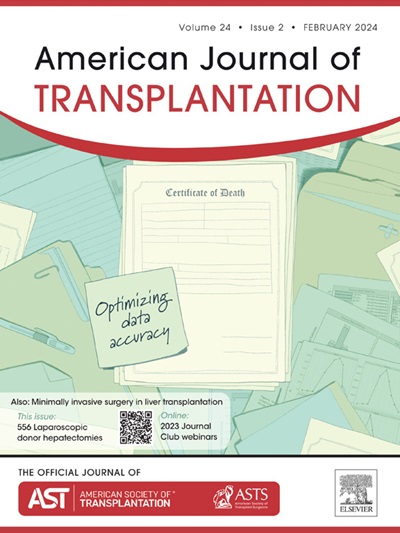Beyond the HIV Organ Policy Equity Act: Roadmap to expanding kidney and liver transplants for people with human immunodeficiency virus utilizing grafts from donors with human immunodeficiency virus
IF 8.2
2区 医学
Q1 SURGERY
引用次数: 0
Abstract
People living with human immunodeficiency virus (HIV) (PWH) face limited access to organ transplantation despite higher rates of end-organ disease. The HIV Organ Policy Equity Act, enacted in 2015, allowed transplants from donors with HIV to recipients with HIV (HIV D+/R+) under research protocols. Studies have since demonstrated overall comparable outcomes between HIV D+/R+ and donors without HIV/R+ transplants, leading to the removal of the research requirement for HIV D+/R+ kidney and liver transplants in November 2024. However, some remaining medical concerns and systemic barriers still need to be addressed, especially for centers that did not participate in the HIV Organ Policy Equity Act. This manuscript reviewed the history, evidence, and key considerations for HIV D+/R+ kidney and liver transplants. Furthermore, a roadmap for implementation, emphasizing the need for reviewing local regulations, establishing multidisciplinary teams, developing personalized protocols, providing medical and cultural training, engaging organ procurement organizations and the local PWH community, and continuing data collection and quality improvement, is discussed. The removal of research restrictions offers a critical opportunity to reduce disparities in transplant access for PWH. Transplant providers should embrace this opportunity to expand access while continuing to address the remaining medical and systemic challenges to ensure that more PWHs receive life-saving transplants.
超越希望法案:利用人类免疫缺陷病毒供体移植扩大人类免疫缺陷病毒患者肾脏和肝脏移植的路线图。
尽管终末器官疾病的发病率较高,但艾滋病毒感染者(PWH)获得器官移植的机会有限。2015年颁布的《艾滋病毒器官政策公平法案》(HIV Organ Policy Equity Act, HOPE)允许根据研究协议,将携带艾滋病毒的捐赠者移植给携带艾滋病毒(HIV D+/R+)的接受者。此后的研究表明,HIV D+/R+和HIV D-/R+移植的总体结果具有可比性,导致2024年11月取消了对HIV D+/R+肾和肝移植的研究要求。然而,一些遗留的医疗问题和系统障碍仍然需要解决,特别是对于那些没有参与“希望法案”的中心。本文回顾了HIV D+/R+肾和肝移植的历史、证据和关键考虑因素。此外,还讨论了实施路线图,强调需要审查地方法规,建立多学科团队,制定个性化协议,提供医疗和文化培训,让器官采购组织和当地PWH社区参与,以及继续收集数据和改进质量。消除研究限制为减少PWH移植获取的差异提供了一个关键机会。移植提供者应抓住这一机会,扩大获取范围,同时继续解决剩余的医疗和系统挑战,以确保更多的PWH接受挽救生命的移植。
本文章由计算机程序翻译,如有差异,请以英文原文为准。
求助全文
约1分钟内获得全文
求助全文
来源期刊
CiteScore
18.70
自引率
4.50%
发文量
346
审稿时长
26 days
期刊介绍:
The American Journal of Transplantation is a leading journal in the field of transplantation. It serves as a forum for debate and reassessment, an agent of change, and a major platform for promoting understanding, improving results, and advancing science. Published monthly, it provides an essential resource for researchers and clinicians worldwide.
The journal publishes original articles, case reports, invited reviews, letters to the editor, critical reviews, news features, consensus documents, and guidelines over 12 issues a year. It covers all major subject areas in transplantation, including thoracic (heart, lung), abdominal (kidney, liver, pancreas, islets), tissue and stem cell transplantation, organ and tissue donation and preservation, tissue injury, repair, inflammation, and aging, histocompatibility, drugs and pharmacology, graft survival, and prevention of graft dysfunction and failure. It also explores ethical and social issues in the field.

 求助内容:
求助内容: 应助结果提醒方式:
应助结果提醒方式:


